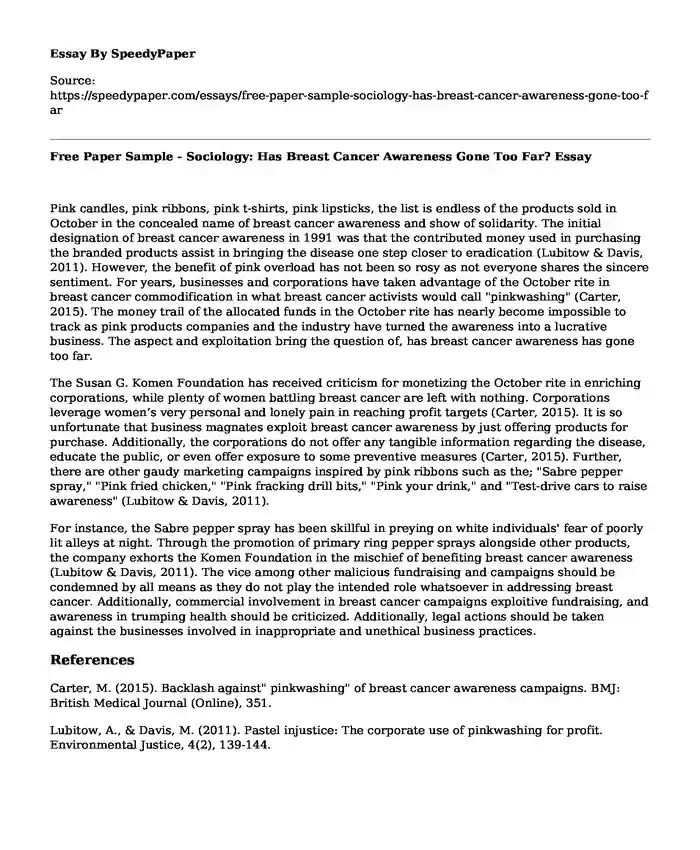Pink candles, pink ribbons, pink t-shirts, pink lipsticks, the list is endless of the products sold in October in the concealed name of breast cancer awareness and show of solidarity. The initial designation of breast cancer awareness in 1991 was that the contributed money used in purchasing the branded products assist in bringing the disease one step closer to eradication (Lubitow & Davis, 2011). However, the benefit of pink overload has not been so rosy as not everyone shares the sincere sentiment. For years, businesses and corporations have taken advantage of the October rite in breast cancer commodification in what breast cancer activists would call "pinkwashing" (Carter, 2015). The money trail of the allocated funds in the October rite has nearly become impossible to track as pink products companies and the industry have turned the awareness into a lucrative business. The aspect and exploitation bring the question of, has breast cancer awareness has gone too far.
The Susan G. Komen Foundation has received criticism for monetizing the October rite in enriching corporations, while plenty of women battling breast cancer are left with nothing. Corporations leverage women’s very personal and lonely pain in reaching profit targets (Carter, 2015). It is so unfortunate that business magnates exploit breast cancer awareness by just offering products for purchase. Additionally, the corporations do not offer any tangible information regarding the disease, educate the public, or even offer exposure to some preventive measures (Carter, 2015). Further, there are other gaudy marketing campaigns inspired by pink ribbons such as the; "Sabre pepper spray," "Pink fried chicken," "Pink fracking drill bits," "Pink your drink," and "Test-drive cars to raise awareness" (Lubitow & Davis, 2011).
For instance, the Sabre pepper spray has been skillful in preying on white individuals' fear of poorly lit alleys at night. Through the promotion of primary ring pepper sprays alongside other products, the company exhorts the Komen Foundation in the mischief of benefiting breast cancer awareness (Lubitow & Davis, 2011). The vice among other malicious fundraising and campaigns should be condemned by all means as they do not play the intended role whatsoever in addressing breast cancer. Additionally, commercial involvement in breast cancer campaigns exploitive fundraising, and awareness in trumping health should be criticized. Additionally, legal actions should be taken against the businesses involved in inappropriate and unethical business practices.
References
Carter, M. (2015). Backlash against" pinkwashing" of breast cancer awareness campaigns. BMJ: British Medical Journal (Online), 351.
Lubitow, A., & Davis, M. (2011). Pastel injustice: The corporate use of pinkwashing for profit. Environmental Justice, 4(2), 139-144.
Cite this page
Free Paper Sample - Sociology: Has Breast Cancer Awareness Gone Too Far?. (2024, Jan 22). Retrieved from https://speedypaper.com/essays/free-paper-sample-sociology-has-breast-cancer-awareness-gone-too-far
Request Removal
If you are the original author of this essay and no longer wish to have it published on the SpeedyPaper website, please click below to request its removal:
- Essay Example on Cost of Medical Error
- Essay Sample about Grief, Death, and Dying
- Free Essay on Addressing the Issue of Eating Disorders from a System's Perspective
- Free Paper Example with Southwest Airlines Case Analysis
- Free Essay Example - Selecting a Product
- Ensuring Criminal Justice: A Need for Medication Treatment - Paper Example
- A Downward Spiral: A Case Study in Homelessness - Free Paper Sample
Popular categories





